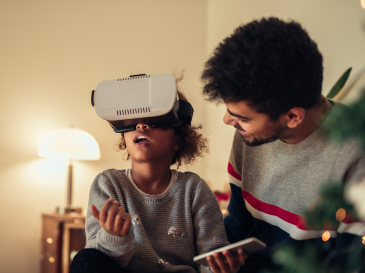Our colleagues at Stanford University’s Virtual Human Interaction Lab are conducting a research survey to investigate the role of VR in educational strategies catered to children while families are sheltering at home as the COVID-19 pandemic progresses. If you are a parent or guardian of a child in grades K-12 and you have a VR headset at home, please consider participating!
 Governments all over the globe have decided to close schools temporarily in an attempt to slow down the spread of COVID-19. As a result of the school closure, parents are facing unprecedented challenges while juggling their own job, keeping their families safe and supervising the distance learning of their children.
Governments all over the globe have decided to close schools temporarily in an attempt to slow down the spread of COVID-19. As a result of the school closure, parents are facing unprecedented challenges while juggling their own job, keeping their families safe and supervising the distance learning of their children.
Technology is playing a central role in this sudden shift into distance learning. Head-mounted display Virtual Reality (VR) has been gaining momentum in the past years by virtually enabling users to engage in activities that would otherwise be dangerous, impossible, counterproductive or expensive.
VR has been around for several decades, but only recently has the cost dropped enough to make VR a consumer-based product. Currently there is a wide range of VR headsets available ranging from the $10 VR cardboard that requires only a smartphone to the high-end headsets that run on expensive gaming-computers. As VR is becoming more mainstream, these headsets have managed to enter tens of millions of households worldwide.
The behavioral and psychological impact of VR use is studied by the Stanford Virtual Human Interaction Lab (VHIL).
As the pandemic unfolds, the VHIL researchers wondered about the role VR headsets play in the homeschooling of children. The Stanford team decided to launch a study on the use of VR in these households, particularly the benefits and limitations of using VR in their new learning situation. This study will inform the field of VR for education by investigating what works, and what should be improved.
In order to successfully run their study, the Stanford team is seeking parents or legal guardians, who live with one (or more) kid(s) who use VR, to fill out this survey: https://stanforduniversity.qualtrics.com/jfe/form/SV_8G3LCFOXQo4OJkF
Participants will also have an opportunity to join the second part of the study involving four short questionnaires over a period of eight weeks. We will compensate the participants of the second part with a $30 Amazon gift card. The results of the survey will be kept confidential.
If you have any questions concerning this study, feel free to contact the VHIL scholars leading the project, Dr. Geraldine Fauville (gfauvill@stanford.edu) and Marijn Mado (mnmado@stanford.edu).

